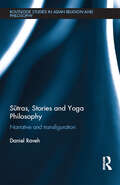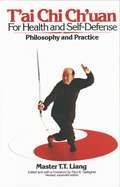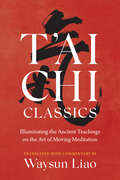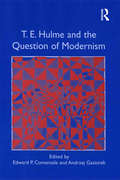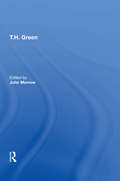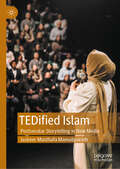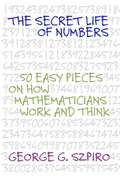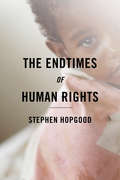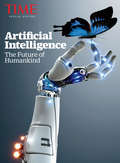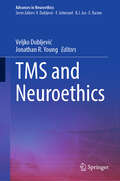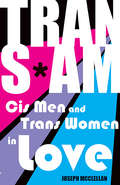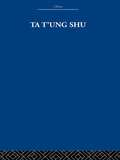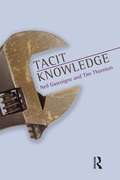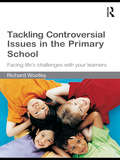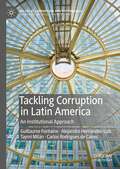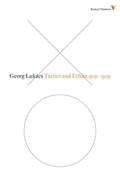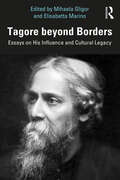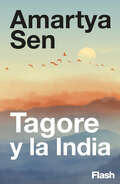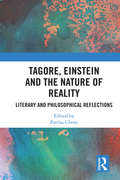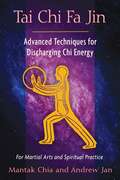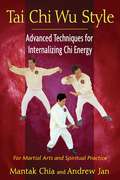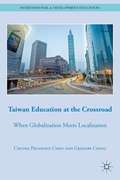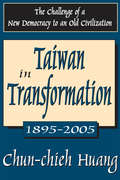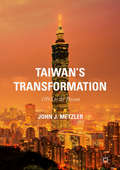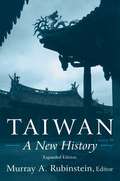- Table View
- List View
Sūtras, Stories and Yoga Philosophy: Narrative and Transfiguration
by Daniel RavehThis book presents a close reading of four Indian narratives from different time periods (epic, Upaniṣadic, pre-modern and contemporary): Ekalavya's story from the Mahābhārata (MBh 1.123.1-39), the story of Prajāpati, Indra and Virochana from the Chāndogya Upanisad (CU 8.7.1-8.12.5), the story of Śankara in the King's body from the Śankaradigvijaya, and A.R. Murugadoss's Hindi film Ghajini (2008), respectively. These stories are thematically juxtaposed with Pātañjala-yoga, namely Patañjali's Yogasūtra and its vast commentarial body. The sūtras reveal hidden philosophical layers. The stories, on the other hand, contribute to the clarification of "philosophical junctions" in the Yogasūtra. Through sūtras and stories, the author explores the question of self-identity, with emphasis on the role of memory and the place of body in identity-formation. Each of the stories diagnoses the connection between self-identity and (at least a sense of) freedom. Employing cutting-edge methodology, crossing the boundaries of literary theory, story-telling, and philosophical reflection, this book presents fresh interpretations of Indian thought. It is useful to specialists in Asian philosophy and culture.
T'Ai Chi Ch'uan for Health and Self-Defense: Philosophy And Practice
by T. T. LiangFor the student who has already mastered the basic postures, this book addresses itself to the philosophy behind the system of movements and to all the variations possible.From the Trade Paperback edition.
T'ai Chi Classics: Illuminating the Ancient Teachings on the Art of Moving Meditation
by Waysun LiaoAn essential guide for T&’ai Chi practitioners of all skill levels—with an overview of basic principles and commentary on three classic internal martial arts texts According to Master Liao, the great power of T&’ai Chi cannot be realized without knowing its inner meaning. T&’ai Chi Classics presents the inner meaning and techniques of T&’ai Chi movements through translations of three core classics of T&’ai Chi, often considered the &“T&’ai Chi Bible&”. Divided into three chapters, the guide explains how to increase inner energy (ch&’i), transform it into inner power (jing), and project this inner power outward to repel an opponent without physical contact. Master Liao also provides a description of the entire sequence of T&’ai Chi movements, illustrated by his own line drawings.
T.E. Hulme and the Question of Modernism
by Andrzej GasiorekThough only 34 years old at the time of his death in 1917, T.E. Hulme had already taken his place at the center of pre-war London's advanced intellectual circles. His work as poet, critic, philosopher, aesthetician, and political theorist helped define several major aesthetic and political movements, including imagism and Vorticism. Despite his influence, however, the man T.S. Eliot described as 'classical, reactionary, and revolutionary' has until very recently been neglected by scholars, and T.E. Hulme and the Question of Modernism is the first essay collection to offer an in-depth exploration of Hulme's thought. While each essay highlights a different aspect of Hulme's work on the overlapping discourses of aesthetics, politics, and philosophy, taken together they demonstrate a shared belief in Hulme's decisive importance to the emergence of modernism and to the many categories that still govern our thinking about it. In addition to the editors, contributors include Todd Avery, Rebecca Beasley, C.D. Blanton, Helen Carr, Paul Edwards, Lee Garver, Jesse Matz, Alan Munton, and Andrew Thacker.
T.H. Green (International Library Of Essays In The History Of Social And Political Thought)
by John MorrowThis volume collects a range of the most important published critical essays on T.H. Green's political philosophy. These essays consider Green's ethical and political philosophy, his accounts of freedom, rights, political obligation and property and the location of his political theory in the discourses of Victorian liberalism. It concludes with a selection of essays that provide comparative discussions of aspects of Green's political philosophy with positions advanced by Sidgwick, Rousseau, Kant and Hegel, and with both conservative and liberal responses to his ideas that emerged in late nineteenth and early twentieth century Japan.
TEDified Islam: Postsecular Storytelling in New Media
by Jasbeer Musthafa MamalipurathThis book represents one of the initial comprehensive studies of TED Talks on Islam. It situates TED Talks on Islam as postsecular (secular’s renewed interest in faith) discourse and asks how TED represents and narrates Islam. It also examines the perspectives of both Muslim and non-Muslim TED viewers about TED’s storytelling strategies as well as on the platform. Finally, the book studies the features of the authority that both Muslim and non-Muslim TED speakers embody as ‘spokespersons of Islam’. By doing so, this book offers an empirical and context-oriented understanding of postsecular storytelling by problematising the secular translations of Islam.
THE SECRET LIFE OF NUMBERS: 50 Easy Pieces on How Mathematicians Work and Think
by George G. SzpiroMost of us picture mathematicians laboring before a chalkboard, scribbling numbers and obscure symbols as they mutter unintelligibly. This lighthearted (but realistic) sneak-peak into the everyday world of mathematicians turns that stereotype on its head.Most people have little idea what mathematicians do or how they think. It’s often difficult to see how their seemingly arcane and esoteric work applies to our own everyday lives. But mathematics also holds a special allure for many people. We are drawn to its inherent beauty and fascinated by its complexity—but often intimidated by its presumed difficulty. The Secret Life of Numbers opens our eyes to the joys of mathematics, introducing us to the charming, often whimsical side, of the discipline. Divided into several parts, the book looks at interesting and largely unknown historical tidbits, introduces the largerthan- life practitioners of mathematics through the ages, profiles some of the most significant unsolved conjectures, and describes problems and puzzles that have already been solved. Rounding out the table of contents is a host of mathematical miscellany—all of which add up to 50 fun, sometimes cheeky, shorttakes on the field. Chock full of stories, anecdotes, and entertaining vignettes, The Secret Life of Numbers shows us how mathematics really does affect almost every aspect of life—from the law to geography, elections to botany—and we come to appreciate the delight and gratification that mathematics holds for all of us.
THE endtimes OF human rights
by Stephen Hopgood"We are living through the endtimes of the civilizing mission. The ineffectual International Criminal Court and its disastrous first prosecutor, Luis Moreno-Ocampo, along with the failure in Syria of the Responsibility to Protect are the latest pieces of evidence not of transient misfortunes but of fatal structural defects in international humanism. Whether it is the increase in deadly attacks on aid workers, the torture and 'disappearing' of al-Qaeda suspects by American officials, the flouting of international law by states such as Sri Lanka and Sudan, or the shambles of the Khmer Rouge tribunal in Phnom Penh, the prospect of one world under secular human rights law is receding. What seemed like a dawn is in fact a sunset. The foundations of universal liberal norms and global governance are crumbling. "-from The Endtimes of Human Rights In a book that is at once passionate and provocative, Stephen Hopgood argues, against the conventional wisdom, that the idea of universal human rights has become not only ill adapted to current realities but also overambitious and unresponsive. A shift in the global balance of power away from the United States further undermines the foundations on which the global human rights regime is based. American decline exposes the contradictions, hypocrisies and weaknesses behind the attempt to enforce this regime around the world and opens the way for resurgent religious and sovereign actors to challenge human rights. Historically, Hopgood writes, universal humanist norms inspired a sense of secular religiosity among the new middle classes of a rapidly modernizing Europe. Human rights were the product of a particular worldview (Western European and Christian) and specific historical moments (humanitarianism in the nineteenth century, the aftermath of the Holocaust). They were an antidote to a troubling contradiction-the coexistence of a belief in progress with horrifying violence and growing inequality. The obsolescence of that founding purpose in the modern globalized world has, Hopgood asserts, transformed the institutions created to perform it, such as the International Committee of the Red Cross and recently the International Criminal Court, into self-perpetuating structures of intermittent power and authority that mask their lack of democratic legitimacy and systematic ineffectiveness. At their best, they provide relief in extraordinary situations of great distress; otherwise they are serving up a mixture of false hope and unaccountability sustained by human rights as a global brand. The Endtimes of Human Rights is sure to be controversial. Hopgood makes a plea for a new understanding of where hope lies for human rights, a plea that mourns the promise but rejects the reality of universalism in favor of a less predictable encounter with the diverse realities of today’s multipolar world.
TIME Artificial Intelligence: The Future of Humankind
by The Editors of TIMEThe future of humankindArtificial intelligence has moved beyond science fiction and into reality, changing history and touching our lives in so many ways-from how astronomers explore the edges of our universe to whether your music system understands the difference between John Legend and John Lennon. Digital assistants such as Siri and Alexa as well as the next generation of smartphones, genomic research, instant language translation and self-driving cars all incoporate artificial intelligence. In this new special edition from TIME, Artificial Intelligence: The Future of Humankind, readers delve into this fascinating field, with authoritative essays and infographics and compelling images of the machines, the science and the people that are changing the course of the future. With a history of A.I., a glossary of the terms that will soon become commonplace, a detailed Q&A and focused articles on how A.I. is changing entertainment, education, technology, communication-and everything else-TIME: Artificial Intelligence is your guide to the future.
TMS and Neuroethics (Advances in Neuroethics)
by Veljko Dubljević Jonathan R. YoungAs transcranial magnetic stimulation (TMS) continues to expand from a tool of neuroscience research into a growing array of clinical applications, it presents a number of open questions that both invite and complicate ethical evaluation. Empirically supported concerns remain regarding interactions between TMS and psychiatric medications or other interventions, the potential for adverse effects in stimulated brain regions, and whether modulation of brain activity—particularly via changes in oscillatory states—might affect aspects of personhood. This volume explores the ethical landscape surrounding TMS in both research and clinical settings. Prior neuroethics literature has largely focused on theoretical implications of neurostimulation technologies, including conceptual clarification (e.g., invasiveness) and normative questions regarding the alignment of these technologies with societal values. However, while some empirical work has captured perspectives from TMS patients, many key voices—such as those of family members, clinicians, and underrepresented communities—have remained absent from scholarly discussions. Spanning historical reflection, theoretical debate, empirical analysis, and clinical insight, this collection features contributions from scholars and practitioners working at the intersection of neuroethics, neuroscience, psychiatry, and biomedical engineering. Part I of the volume offers historical and theoretical reflections, including the origins and growth of TMS research, racial disparities in access and participation, caregiver perspectives, and emerging issues related to cognitive enhancement, non-clinical use, and applications in social neuroscience and creativity. Part II turns to new directions and ethical issues in clinical TMS research, addressing treatment subgrouping, adolescent and geriatric use, mood and substance use disorders, suicidality, and the evolving regulatory landscape. Together, these chapters provide an interdisciplinary examination of the ethical, clinical, and societal dimensions of TMS. Whether as an introduction to the neuroethics of brain stimulation or as a resource for neuroscientists, clinicians, engineers, and ethicists, this volume aims to foster greater understanding and dialogue around the responsible development and application of TMS.
TRANS*AM: Cis Men and Trans Women in Love
by Joseph McclellanTrans women--assigned male at birth and later transitioned into a female gender-- are recently in media because of celebrities and controversial legislation. Therefore cis men--who identify with a masculine gender they were assigned at birth--are now called upon to share their experiences as lovers of trans women. Using theory and personal anecdotes, the author questions the codes that cis men and trans women use to interpret their own and others' gendered and sexed bodies. Joseph McClellan, Assistant Professor, Department of Politics, Philosophy, and Economics, Asian University for Women, Chittagong, Bangladesh, has taught philosophy, Buddhism, and gender studies, and translated and introduced contemporary French philosopher Michel Onfray'sA Hedonist Manifesto: The Power to Exist.
Ta t'ung Shu: The One-World Philosophy of K'ang Yu-wei
by Laurence G. ThompsonFirst published in 1958.This volume translates one of the major works of modern Chinese philosophy and in so doing makes a major contribution to the study of comparative philosophy. The volume contains an extensive introduction structured as follows: 1. Biographical Sketch of K'ang Yu-wei2. Ta T'ung Shu: The Book3. A General Discussion of the One-W
Tacit Knowledge
by Tim Thornton Neil GascoigneTacit knowledge is the form of implicit knowledge that we rely on for learning. It is invoked in a wide range of intellectual inquiries, from traditional academic subjects to more pragmatically orientated investigations into the nature and transmission of skills and expertise. Notwithstanding its apparent pervasiveness, the notion of tacit knowledge is a complex and puzzling one. What is its status as knowledge? What is its relation to explicit knowledge? What does it mean to say that knowledge is tacit? Can it be measured? Recent years have seen a growing interest from philosophers in understanding the nature of tacit knowledge. Philosophers of science have discussed its role in scientific problem-solving; philosophers of language have been concerned with the speaker's relation to grammatical theories; and phenomenologists have attempted to describe the relation of explicit theoretical knowledge to a background understanding of matters that are taken for granted. This book seeks to bring a unity to these diverse philosophical discussions by clarifying their conceptual underpinnings. In addition the book advances a specific account of tacit knowledge that elucidates the importance of the concept for understanding the character of human cognition, and demonstrates the relevance of the recommended account to those concerned with the communication of expertise. The book will be of interest to philosophers of language, epistemologists, cognitive psychologists and students of theoretical linguistics.
Tackling Controversial Issues in the Primary School: Facing Life's Challenges with Your Learners
by Richard WoolleyHow do you broach family values with seven year olds? Can you help young children understand racism? Can you avoid bringing your own prejudices into the classroom? Talking effectively about controversial issues with young children is a challenge facing every primary school teacher. Tackling Controversial Issues in the Primary School provides teachers with support and guidance as you engage with the more tricky questions and topics you and your pupils encounter. Illuminated with case studies and examples of how teachers and children have confronted issues together, this book helps you understand your own perspectives and provides fresh approaches for the primary classroom. It considers how best to work with parents and carers, whole-school policies for tackling issues, and ideas for circle time, setting up international links, school councils and buddying systems. The range of challenging topics covered includes: family values racism in mono and multi-cultural settings democracy and citizenship the environment and sustainability consumerism, finances and media advertising gender, health and identity grief and loss. For all student and practising primary teachers, Tackling Controversial Issues in the Primary School provides much needed support as you help your learners face complicated ideas, find their voice and get involved in the issues that they feel make a difference.
Tackling Corruption in Latin America: An Institutional Approach (Political Corruption and Governance)
by Guillaume Fontaine Alejandro Hernández-Luis Taymi Milán Carlos Rodrigues de CairesThis book examines anti-corruption policies in Latin America. It compares best practices in public procurement and state budgets in order to provide new insights into policy design for governments, civil society organisations and international organisations engaged in the fight against corruption. The book assesses how a paradigm shift toward transparency in global governance has led to major changes in public policies in the region since the late 1990s. Using Uruguay and Chile as case studies, it then demonstrates the causal mechanisms linking transparency institutionalisation to corruption control. The book also offers recommendations for research and practice about the importance of coherent public accountability systems, that combine citizen oversight over government with government responsibility towards non-state actors. It will appeal to scholars and students of public policy, public administration and governance in Latin America, as well as those interested in political corruption.
Tactics and Ethics
by Georg LukacsTactics and Ethics collects Georg Lukács's articles from the most politically active time of his life, a period encompassing his stint as deputy commissar of education in the Hungarian Soviet Republic. Including his famed essay on parliamentarianism--which earned Lukács the respectful yet severe criticism of Lenin--this book is a treasure chest of valuable insights from one of history's great political philosophers.
Tagore beyond Borders: Essays on His Influence and Cultural Legacy
by Mihaela Gligor Elisabetta MarinoThis book looks at Rabindranath Tagore’s creative art, social commitment, literary and artistic representation and his unique legacy in the cultural history of modern India – as a blend of the quintessentially Indian and the liberal universalist. Tagore’s genius, which he expressed through his poetry, songs, paintings, drama and philosophy, is celebrated across the globe. In 1913, he was awarded the Nobel Prize for Literature for his volume of poetry, Gitanjali (Song Offerings), making him the first Nobel laureate from Asia. This volume of essays celebrates his intellectual engagements and his incredible legacy by discussing the diverse ways in which his works have been reinterpreted, adapted and translated over the years. It analyses his perspectives on modernity, nationalism, liberation, education, post-colonialism and translatability and their relevance today. The leitmotif is a Tagore who, while imaginable as made possible only within the Indian tradition, eludes attempts aimed at identification with a national culture and remains a "cosmopolitan" in the best sense of the term.This volume will be of interest to readers and researchers in the fields of literature, philosophy, political science, cultural studies, Asian studies, South Asian studies and Tagore studies. Fans of Tagore will also find this an interesting read as it presents many little knows aspects of the poet’s work.
Tagore y la India
by Amartya SenUna apasionante semblanza del Premio Nobel de Literatura más desconocido. Premio Princesa de Asturias de las Ciencias Sociales 2021 Premio Nobel de Economía 1998 Existe un auténtico contraste entre la presencia intelectual de Rabindranath Tagore en la literatura, la política y la sociedad bengalíes y su imagen de gurú espiritual que llegó hasta Occidente. Entre ambas facetas se abre un amplio espacio surcado por numerosos debates en torno a la religiosidad, el sistema de castas y la independencia que llevaron a considerarlo en India una de las personalidades más polifacéticas y preeminentes del siglo XXI. Amartya Sen recorre en esta breve semblanza las piedras angulares del argumentario del pensador bengalí, un escritor de elegante prosa y mágica poesía, y redescubre a los lectores occidentales al Tagore más oculto: el concienciado activista, el pintor de enorme talento y el gran estratega político. «Rabindranath sabía que no habría podido brindarle a la India el liderazgo político que Gandhi le confirió, y nunca hubo ironía en su reconocimiento de lo que Gandhi hizo por la nación (de hecho, fue Tagore quien popularizó el tratamiento de Mahatma —alma grande— para Gandhi)».
Tagore, Einstein and the Nature of Reality: Literary and Philosophical Reflections (Routledge Studies In The Philosophy Of Mathematics And Physics Ser.)
by Partha GhoseThis volume consists of a selection of scholarly essays from literature, philosophy and history on the conception of reality as understood by Rabindranath Tagore and Albert Einstein. The nature of reality has been a long-debated issue among scientists and philosophers. Tagore (1861–1941) met Einstein (1879–1955) at the latter’s house in Kaputh, Germany on 14 July 1930 and had a long conversation on this issue. This conversation has been widely quoted and discussed by scientists, philosophers and scholars from the literary world. The important question that Tagore and Einstein discussed was whether the world is a unity dependent on humanity, or the world is a reality independent of the human factor. Einstein believed that reality is independent of the mind and the human factor. On the other hand, Tagore adopted the opposite view. Nevertheless, both Einstein and Tagore claimed to be realists — their conceptions of reality were obviously fundamentally different. Where does the difference lie? Can it be harmonized at a deeper level? This volume brings together for the first time a gamut of views on this subject from eminent scholars. It presents some key reflections on reality, language, poetry, truth, science, personality, human sciences, virtue ethics, intelligibility and creativity. It will be useful to scholars and researchers of philosophy, literature, history and political studies, as also to those interested in Tagore.
Tai Chi Fa Jin: Advanced Techniques for Discharging Chi Energy
by Mantak Chia Andrew JanA guide to the seemingly effortless yet explosively powerful martial art techniques of Fa Jin • Explains how to collect energy within and discharge it for self-defense as well as healing • Explores how to counter the natural instinct to resist force with force and develop yielding softness through the 13 Original Movements of Tai Chi • Illustrates routines for the partner practice of “Push Hands” (Tui Shou) Fa Jin, an advanced yang style of Tai Chi, complements the physical, mental, and spiritual conditioning available through solo Tai Chi practice and the internal martial arts of Taoism. Fa Jin enables adepts to harness the energy of yin, yang, and the earth in the lower tan tien and discharge it as an extremely close-range yet explosively powerful blow in self-defense and partner practice as well as in healing techniques. Integrating the teachings of many Taoist masters, including Chang San-Feng, the creator of Tai Chi; Wang Tsung-Yueh, the legendary 19th-century master; Bruce Lee, the actor and martial artist who made the “one-inch punch” technique famous; and the Magus of Java, a living master able to discharge energy in the form of electric shocks, this book explores the history, philosophy, internal exercises, and physical practices of Fa Jin. Drawing on Iron Shirt Chi Kung and Tan Tien Chi Kung techniques, Master Mantak Chia and Andrew Jan reveal the secrets to collecting yin and yang in the lower tan tien and discharging the energy in a seemingly effortless yet explosive blow. Illustrating several routines of the Tai Chi partner practice of “Push Hands” (Tui Shou), they explain how to apply Fa Jin techniques by “listening” to your opponent’s intentions and countering the natural instinct to resist force with force through yielding softness and redirection. The authors also detail how to prepare for this advanced practice through stretching, meditation, breathing, relaxation, and energetic exercises.
Tai Chi Wu Style: Advanced Techniques for Internalizing Chi Energy
by Mantak Chia Andrew JanA guide to the internal martial arts exercises of short-form Wu-Style Tai Chi • Details the 8 core forms of Wu-Style Tai Chi with fully illustrated instructions • Ideal for older practitioners as well as those with health disabilities due to the “small frame” primary stance, slower and smaller movements, and conservation of energy • Explains how Wu Style provides a natural introduction to martial arts boxing • Reveals how Wu Style eases stiffness, relieves back pain, and reduces abdominal fat Following the flow of chi energy, rather than directing it as in traditional Tai Chi, Wu-Style Tai Chi focuses on internal development, seeking to conserve chi energy and gather jin power from the Earth through the tan tien. Centered on a “small frame” stance--that is, feet closer together and arms closer to the body--and a slower progression of movements in solo practice, Wu Style offers a gentle Tai Chi form for beginners and, when practiced with a partner, a grounding introduction to martial arts boxing and Fa Jin (the discharge of energy for self-defense). The more functional stance, smaller movements, and conservation of internal energy make Wu-Style Tai Chi ideal for older practitioners as well as those with health disabilities. Condensing the 37 movements of Wu Style into 8 core forms, Master Mantak Chia and Andrew Jan illustrate how to build a personal short-form Wu-Style Tai Chi practice. They explain how Wu-Style Tai Chi removes energetic blockages and helps to elongate the tendons, reducing stiffness and allowing the limbs to return to their natural length and full range of motion. Regular practice of Wu Style relieves back pain as well as reducing abdominal fat, the biggest hindrance to longevity. Exploring the martial arts applications of Wu Style, the authors trace its history beginning with founder Wu Chuan-Yu (1834-1902) as well as explain how to apply Wu Style to “Push Hands” (Tui Shou) and Fa Jin. Through mastering the short-form Wu Style detailed in this book, Tai Chi practitioners harness a broad range of health benefits as well as build a solid foundation for learning the complete long-form Wu Style.
Taiwan Education at the Crossroad
by Chuing Prudence Chou Gregory ChingChou and Ching examine the processes of schooling in Taiwan amidst social, cultural, economic, and political conflict resulting from local and global dilemmas. Collectively, these issues offer a panoramic and in-depth glimpse from the past to the future of educational trends in Taiwan.
Taiwan in Transformation 1895-2005: The Challenge of a New Democracy to an Old Civilization
by Chun-chieh HuangThe last decade of the twentieth century witnessed rapid changes not only in global politics but also in Taiwan's quests for new identities. The notorious martial law was lifted in July 1987, and long-repressed calls for democratization began to be heard that caught worldwide attention. In tandem with economic transformation, the entire world of thought in Taiwan underwent significant changes. Both economic and ideological restructuring have been basic elements of transformation in postwar Taiwan. However, rapid democratization has opened a Pandora's box, and stirred a whirlwind of discord.This volume elaborates on the "where from" and the "where to" of the Taiwan transformation and attempts to answer such questions as: Is the old Taiwanese work ethic just a relic of the past? Is Taiwan going to become an Armageddon of ideological wars?Chapters deal with the vicissitudes of Taiwanese nostalgia for cultural China; postwar Taiwan in historical perspective, in particular the rise and fall of the agrarian culture; the transformation of farmers' social consciousness in the period 1950-1970; Confucianism in postwar Taiwan: historical, philosophical, and sociological; the case of Hsu Fu-kuan, which provides an epic case of the intertwining of cultural crisis with personal crisis; the development and metamorphoses of Taiwanese consciousness in the unfolding political context, the awakening of the "self"; and finally "mutual historical understanding" as the basis for Taiwan-Mainland relations in the twenty-first century.Taiwan in Transformation seeks to show that historical insights extrapolated from an understanding of history are essential for grasping and solving the basic problems facing Taiwan at present, including the Taiwan-Mainland relationship in the twenty-first century. It will be of interest to Chinese area specialists, sociologists, and historians.
Taiwan's Transformation: 1895 to the Present
by John J. MetzlerThis book presents a cogent but comprehensive review of Taiwan’s socio-economic transformation from a Japanese colony to a thriving East Asian mini-state. Since the 1980’s, Taiwan has primarily been viewed as a thriving economic model. Though certainly true, this assessment belies the amazing social and political success story for 23 million people on a small New Hampshire-sized island just off the China coast. Metzler highlights the engaging political narrative of democratization as well as Taiwan’s noteworthy accomplishments despite the proximity and opposition of communist China. Further, the result of the 2016 elections and its implication are analyzed. Scholars studying East Asia and policy makers will gain a greater appreciation for the island’s dynamic, prosperous resilience, despite pressure from China.
Taiwan: A New History (Taiwan In The Modern World Ser.)
by Murray A. RubinsteinThis is a comprehensive portrait of Taiwan. It covers the major periods in the development of this small but powerful island province/nation. The work is designed in the style of the multi-volume "Cambridge History of China".
